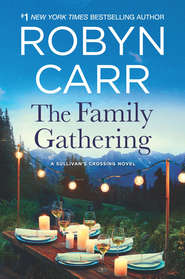По всем вопросам обращайтесь на: info@litportal.ru
(©) 2003-2024.
✖
A Virgin River Christmas
Автор
Год написания книги
2019
Настройки чтения
Размер шрифта
Высота строк
Поля
Jack was quiet a moment, and Marcie took a few more bites of food. She spread butter on the corn bread and gobbled up half, giving lie to her “not hungry” state.
“I started sending letters to Fortuna after that, but he didn’t respond. I think I wrote him more for myself than for him, and I pictured him reading them, but … I invited him to call me collect, but I never heard from him.”
“And you’re going after him?” Jack finally said.
“I’m going to find him,” she affirmed. “I have to know if he’s all right. I’ve thought about it a lot—for all I know, he might’ve come back from Iraq with some serious issues, maybe not as plain to the naked eye as Bobby’s issues. I’d blame the Marine Corps for not helping him, if that was the case.”
“Well, you’re right—if he needed help, they should’ve helped. But try not to be too hard on the Corps. It gets complicated—you train a marine to be fearless, then expect him to ask for help? Doesn’t add up. When I figure out how they should get around that, I’ll write the state department.”
“Just the same …”
“Could be he chose the lifestyle he wants. I came out of the Corps looking for a quiet place to hunt and fish and found Virgin River. I holed up for a while, too.”
“Did you lose contact with your family?” she asked, lifting one tawny brow. “Refuse to answer mail?”
Jack had not only had constant contact with his family, but with his squad. And he appreciated it. “No. Point taken.”
“I’m going to find him. Some things need to be sorted out. Finished. You know?”
“Listen, what if he’s not all right?” Jack ventured, leaning both hands on the bar and looking at her closely. Intensely. “What if he’s a little nuts or something? Even dangerous?”
“He still has a father who’s getting older and isn’t well. Things are unsettled with the two of them. Mr. Buchanan is a stubborn, crotchety old coot, but I bet underneath all that crust he wants his son back, no matter what he is. I would.” She started on her salad.
“I get that,” Jack said. “But what if he’s dangerous to you?”
She let go a short laugh. “I guess it’s possible, but I doubt it,” she said. “I’ve been to the police department, sheriff’s department and every gas station, hardware store and bar around—he doesn’t have a record and no one knows him. If he was dangerous, he would probably have drawn some attention to himself, don’t you think? He’s probably just a sulky, troubled, screwed-up marine who thinks dropping out is better than dealing with his baggage. And he’d be wrong.”
“You wanna think this through?” he asked. “Marines all screwed up by war have a lot of mysterious reasons for taking that route, dropping out like that. Could be he’d like to forget, and seeing you just makes things worse.”
“Well, you’ve been to war, so you would know something about that—”
“Boy howdy, as my wife would say. I’ve carried around my own crap, had a problem or two with PTSD. Luckily, I have strong support.”
“He’s only thirty-five, time enough to start over, patch things up with anyone he’s alienated himself from, get beyond any trauma he has over what happened to Bobby. His father might’ve been a little pissed off back when they fought, but the old man still loves his son. I’d bet on that.” She took a sip of her beer and said, quietly, “I might lose my money, but I’d bet.”
“Then why doesn’t his father try to find him?” Jack asked.
“Why didn’t anyone? His ex-fiancée really hates him for ditching her, his father is seventy-one and sick. Widowed, bitter, stubborn. I gotta say, he’s one mean, unforgiving old man. But even if there’s no help for that, I can get to know Bobby’s best friend again. We only wrote for a few months, but I thought I knew him. And he was sweet. This is going to sound silly—his handwriting was strong and nice, the things he wrote were kind and sensitive. I kind of feel like I lost a friend and …” She smiled at Jack. “Besides, no one’s as determined as I am.”
“And why is that? Why are you so determined?”
She looked down. “I can’t move on until I know why the man my husband loved most, admired most, would disappear like that. Ignore us the way he did. Let himself be gobbled up by a forest and not have any contact with his family, his friends. Really—that’s the insane part. I have to know why. I want to be sure he’s okay. Then I’ll let it go.” She looked up. “Then maybe we can all move on.”
Jack couldn’t help but grin at her; she sure knew what she wanted. He watched her shovel the last of her salad into her mouth. “Chocolate cake?” he asked. “It’ll bring you to your knees.”
“No, thanks. This was good.” Her wallet still sat on the bar. She drained the beer, then began leafing through the bills in her wallet. “What do I owe you?”
“You’re kidding me, right? You’re going out in the woods to find one of my brothers and you think I’d take your money? Hell, I’d offer to help, but you can see—I can’t leave Melinda alone for one second. She’s trouble. Nah, it’s my pleasure to give you a little meal. Anytime you want, in fact. Check in here regular, fuel up your belly, let us know if you find anything … anyone. We’d all appreciate that. Bunch of us jarheads from Fallujah around here.”
“Why are there marines here?”
“Sweetheart, there are marines everywhere.” He grinned. “Once I opened the bar, a lot of my old squad started showing up to hunt or fish. A couple of them didn’t have better options and moved here. Really, we try to look out for our kind. All for one,” he added.
She closed the wallet and smiled at him, an affectionate, grateful smile. She was well-trained in taking whatever help was offered. “Then I’ll have the cake,” she said.
“And coffee?” he asked.
“Oh, God, yes, coffee,” she said, almost sighing in appreciation. A cold beer, a hot cup of good coffee—two of her biggest weaknesses.
“Best coffee you’ll ever taste,” he said, filling a cup for her. When a thick slice of cake sat before her, he asked, “When you find him, what are your plans?”
“He was awful good to Bobby—I’d just like to thank him. Talk to him. Get to know him again, like I started to before. I have something of Bobby’s to give him. I plan to ask him what happened, see if there’s anything I can do for him now. Maybe once we get through all that, we’ll both be happier. Obviously he hasn’t moved on, and I need a little more closure. Wouldn’t it be great if we could both get that? Aw, I don’t know, Jack. Freedom? The freedom to put the past in the past?”
Jack’s eyebrows rose. “And if he’s not inclined to talk?” She put a big forkful of velvety, rich chocolate cake into her mouth, scraping the icing off the fork with her teeth and lips. She let her eyes drop closed for a brief luxurious moment. Then she smiled at Jack Sheridan and said, “Then I’ll be his worst nightmare until he comes around. I’m not giving up.”
Before Marcie had finished her coffee, a good-looking Hispanic man came into the bar by way of the side door. He had a disgruntled look on his face and was carrying a catalog. “Your wife has me in search of the perfect tree topper,” he said to Jack. “Whose idea was this again?”
“I think it was yours,” Jack said. “And don’t complain to me—there’s no way to decorate that tree without a cherry picker. I’m going to have to rent one before I see Mel using ropes and pulleys to get to the top. Mike, meet Marcie—Marcie, say hello to Mike Valenzuela.”
“How do you do,” she said, sticking out a hand.
He took it, smiled and said, “Pleasure. This was his idea—the big tree. Trying to impress his wife. She requested a large tree—he had us out in the hills a full day till he found the biggest tree we could take down in one piece.”
Just a little embarrassed, Jack interrupted Mike, “Marcie here is looking for a marine who dropped out after Iraq. Show him the picture, Marcie.”
She pulled it out again and once again explained the possible changes in his appearance since the photo was taken.
“Don’t know him,” Mike said.
“But he might be so different …”
“Don’t know the eyes,” Mike said.
She let out a heavy sigh. “Any ideas where I might look?”
“Well,” Mike began, scratching his chin. “I haven’t seen him, but that doesn’t mean he hasn’t been seen. There are a lot of people out in the mountains who have been there for years and they aren’t real sociable—maybe one of them has seen him.”
“Can you tell me where to go?” she asked.
“I can give you a couple of markers,” he said. “More important, I’d like to tell you a few places to steer clear of—there are some illegal growers out there who get real territorial. Real unfriendly. Sometimes their property is booby-trapped.” He pulled a large napkin out from under the bar, brought his pen out of his shirt pocket and drew a line on the napkin. “Here’s highway 36 …” In ten minutes, he had drawn a rough map of a half-dozen cabins in the mountains where people lived—people who just might have seen Ian Buchanan. As well, he listed three locations she should avoid.
The cabins Mike X’d on the map were located down abandoned logging roads, sometimes gated, snuggled behind trees and shrubs, impossible to see from the highway. A lot of that mountain property had been homesteaded and logged. Once a property was logged, the owner had to wait another thirty to fifty years to log it again. It became an acreage full of oak, madrone, young fir and pine fifty to sixty feet tall—real pretty, but not mature enough for logging.
“I’ve been roaming around back in there, just checking it out, just to know who’s out there. There are a couple of old men living alone out in the sticks and a couple of old widows. There’s a man and woman combo or two, even a family of five. But so far, no single thirty-five-year-old male.”
“Maybe he’s not single anymore.”
Mike shook his head. “Pretty sure there’s no one in that age group; not with those eyes. Even with a beard.”













